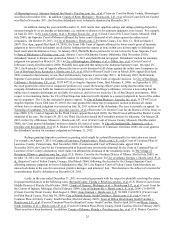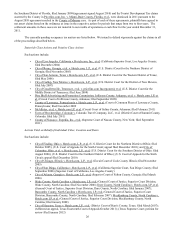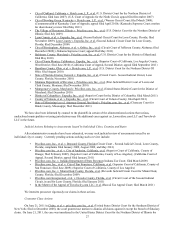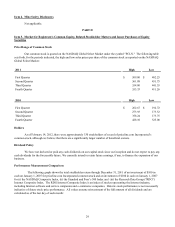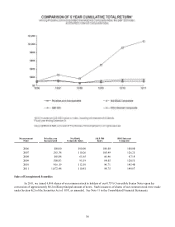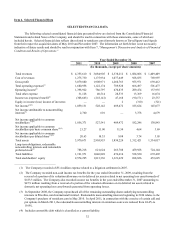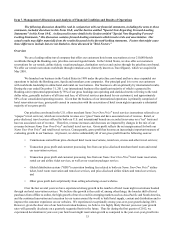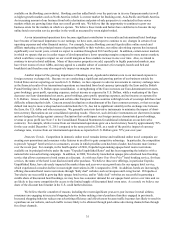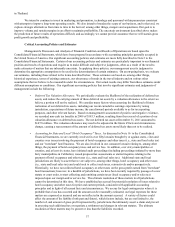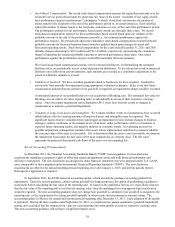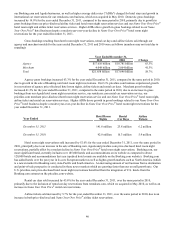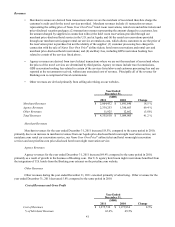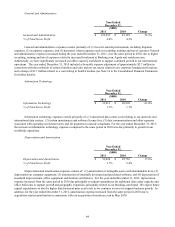Priceline 2011 Annual Report Download - page 36
Download and view the complete annual report
Please find page 36 of the 2011 Priceline annual report below. You can navigate through the pages in the report by either clicking on the pages listed below, or by using the keyword search tool below to find specific information within the annual report.35
available on the Booking.com website). Booking.com has added hotels over the past year in its core European market as well
as higher-growth markets such as North America (which is a newer market for Booking.com), Asia-Pacific and South America.
An increasing amount of our business from both a destination and point-of-sale perspective is conducted in these newer
markets which are growing faster than our overall growth rate. We believe that the opportunity to continue to grow our
business exists for the markets in which we operate. We believe these trends and factors have enabled us to become the top
online hotel reservation service provider in the world as measured by room nights booked.
As our international operations have become significant contributors to our results and international hotel bookings
have become of increased importance to our earnings, we have seen, and expect to continue to see, changes in certain of our
operating expenses and other financial metrics. For example, because Booking.com and Agoda utilize online search and
affiliate marketing as the principal means of generating traffic to their websites, our online advertising expense has increased
significantly over recent years, a trend we expect to continue throughout 2012 and beyond. In addition, certain newer markets
in which we operate that are in earlier stages of development have lower operating margins compared to more mature markets,
which could have a negative impact on our overall margins as these markets increase in size over time. Also, we intend to
continue to invest in hotel additions. Many of these newer properties we add, especially in highly penetrated markets, may
have fewer rooms or lower ADRs, and may appeal to a smaller subset of customers (for example, hostels and bed and
breakfasts) and therefore may also negatively impact our margins over time.
Another impact of the growing importance of Booking.com, Agoda and rentalcars.com is our increased exposure to
foreign currency exchange risk. Because we are conducting a significant and growing portion of our business outside the
United States and are reporting our results in U.S. Dollars, we face exposure to adverse movements in currency exchange rates
as the financial results of our international operations are translated from local currency (principally the Euro and the British
Pound Sterling) into U.S. Dollars upon consolidation. A strengthening of the Euro increases our Euro-denominated net assets,
gross bookings, gross profit, operating expenses, and net income as expressed in U.S. Dollars, while a weakening of the Euro
decreases our Euro-denominated net assets, gross bookings, gross profit, operating expenses, and net income as expressed in
U.S. Dollars. Greece, Ireland, Portugal and certain other European Union countries with high levels of sovereign debt have had
difficulty refinancing their debt. Concern around devaluation or abandonment of the Euro common currency, or that sovereign
default risk may be more widespread and could include the U.S., has led to significant volatility in the exchange rate between
the Euro, the U.S. dollar and other currencies. We generally enter into derivative instruments to minimize the impact of short-
term currency fluctuations on our consolidated operating results. However, such derivative instruments are short term in nature
and not designed to hedge against currency fluctuation that could impact our foreign currency denominated gross bookings,
revenue or gross profit (see Note 5 to the Consolidated Financial Statements for additional information on our derivative
contracts). For example, while revenue from our international operations grew on a local currency basis by approximately 70%
for the year ended December 31, 2011 compared to the same period in 2010, as a result of the positive impact of currency
exchange rates, revenue from our international operations as reported in U.S. Dollars grew 79% year-over-year.
Domestic Trends. Competition in domestic online travel remains intense and traditional online travel companies are
creating new promotions and consumer value features in an effort to gain competitive advantage. In particular, the competition
to provide "opaque" hotel services to consumers, an area in which priceline.com has been a leader, has become more intense
over the recent past. For example, in the fourth quarter of 2010, Expedia began making opaque hotel room reservations
available on its principal website under the name "Expedia Unpublished Rates" and has been supporting the initiative with a
national television advertising campaign. In addition, in 2009, Travelocity launched an opaque price-disclosed hotel booking
service that allows customers to book rooms at a discount. As with our Name Your Own Price® hotel booking service, for these
services, the name of the hotel is not disclosed until after purchase. We believe these new offerings, in particular Expedia
Unpublished Rates, have adversely impacted the market share and year-over-year growth rate for our opaque hotel service,
which experienced a modest decline in room night reservations in 2011 compared to 2010. In addition, hotels are increasingly
offering discounted hotel room reservations through "daily deal" websites such as Groupon and Living Social. If Expedia or
Travelocity are successful in growing their opaque hotel service, and/or "daily deal" websites are successful in garnering a
sizable share of discounted hotel bookings, we may have less consumer demand for our opaque hotel service over time and we
are likely to face more competition for access to the limited supply of discounted hotel room rates. As a result, we believe our
share of the discount hotel market in the U.S. could further decrease.
We believe that for a number of reasons, including the recent significant year-over-year increase in retail airfares,
consumers are engaging in increased shopping behavior before making a travel purchase than they engaged in previously.
Increased shopping behavior reduces our advertising efficiency and effectiveness because traffic becomes less likely to result in
a purchase on our website, and such traffic is more likely to be obtained through paid online advertising channels than through
free direct channels.


